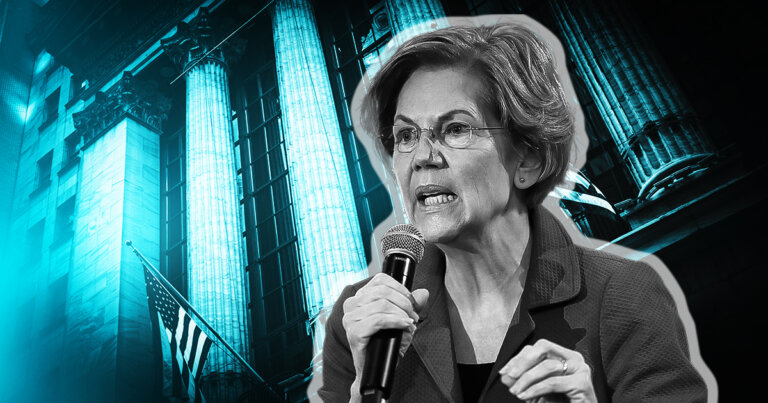 Wall Street banks back Elizabeth Warren’s Digital Asset Anti-Money Laundering Act
Wall Street banks back Elizabeth Warren’s Digital Asset Anti-Money Laundering Act Wall Street banks back Elizabeth Warren’s Digital Asset Anti-Money Laundering Act
The bill, if passed, will impose the same standards and requirements on crypto businesses as banks and other financial institutions.

Gage Skidmore / CC BY-SA 2.0 / Wikimedia. Remixed by CryptoSlate
U.S. senator Elizabeth Warren reintroduced the Digital Asset Anti-Money Laundering Act on July 28, backed by unlikely allies — the Wall Street banks.
The Bank Policy Institute, a financial policy think tank made up of a cohort of banks, backed the legislation that aims to mitigate the national security risks posed by cryptocurrencies. Historically, Warren has been a fervent critic of The Bank Policy Institute, but they seemed to have found common ground — the need to crack down on crypto.
Noting that cryptocurrencies have become the “payment method of choice” among cybercriminals, Warren said in a press release:
“This bipartisan bill is the toughest proposal on the table to crack down on crypto crime and give regulators the tools they need to stop the flow of crypto to bad actors.”
Holding crypto players to banking standards
The legislation, which was first introduced in December 2022, will impose the obligations under the Bank Secrecy Act (BSA) on crypto wallet providers, miners, and validators. Crypto service providers and network participants will, therefore, need to meet know-your-customer requirements if the legislation is passed.
The 7-page bill requires the Treasury Department to set up a compliance examination and review process to ensure all crypto money service businesses comply with the anti-money laundering and countering the financing of terrorism (AML/CFT) obligations under BSA. The bill will also direct the Securities and Exchange Commission (SEC) and the Commodity Futures Trading Commission (CFTC) to set up similar review processes for the crypto businesses under their purview.
Furthermore, crypto businesses must file a Report of Foreign Bank and Financial Accounts (FBAR) with the Internal Revenue Service. Crypto service providers must file the report whenever any U.S. customer uses one or more offshore accounts to conduct crypto transactions over $10,000, as per the bill.
The bill will direct the Financial Crimes Enforcement Network (FinCEN) to implement the rule it proposed in 2020 to close the regulatory gap created by self-custody wallets. The new rule will make it mandatory for banks and money service businesses to verify customer and counterparty identities, maintain records, and file reports for specific crypto transactions involving self-custody wallets or wallets hosted in non-compliant jurisdictions.
The bill also aims to mitigate the risks of crypto ATMs. It will require FinCEN to ensure that ATM owners and administrators regularly report and update the physical addresses of their kiosks. ATM operators must also verify customer and counterparty identity for all transactions.
Lastly, the bill will direct FinCEN to guide financial institutions on mitigating the risks associated with handling, using, or transacting with crypto whose origin has been obscured using mixers or other anonymity-enhancing technologies.
The bill aims to regulate crypto businesses in the same way as banks. As Senator Roger Marshall, a supporter of the bill, stated:
“The reforms outlined in our legislation will help us fight back and secure our digital assets by using proven methods that our domestic financial institutions have been complying with for years.”
Senator Lindsey Graham, who has also backed the bill, added that “many of the same rules that apply to the dollar should exist for crypto.”

























































